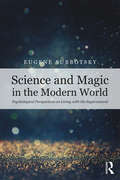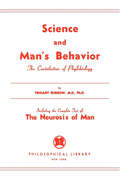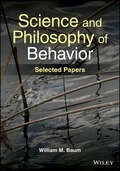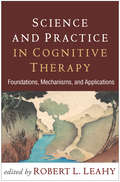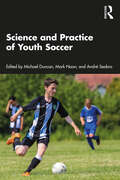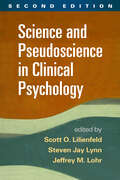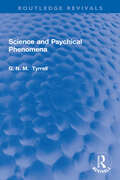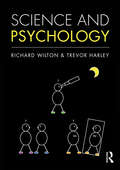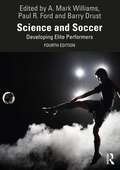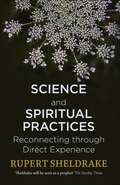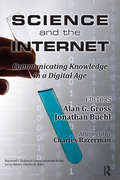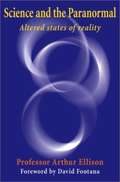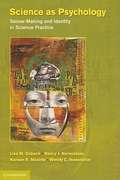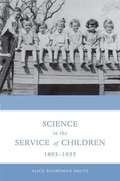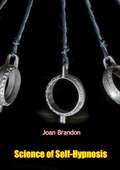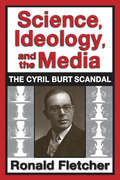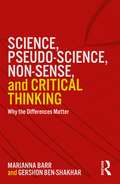- Table View
- List View
Science and Magic in the Modern World: Psychological Perspectives on Living with the Supernatural
by Eugene V. SubbotskyScience and Magic in the Modern World is a unique text that explores the role of magical thinking in everyday life. It provides an excellent psychological look at the subconscious belief in magic in both popular culture and society, as well as experimental research that considers human consciousness as a derivative of belief in the supernatural, thus showing that our feelings, emotions, attitudes and other psychological processes follow the laws of magic. This book synthesises the science of ‘natural’ phenomena and the magic of the ‘supernatural’ to present an interesting look at the juxtaposition of the inner and outer selves. Fusing research into psychological disorders, subconscious feelings, as well as the rising presence of artificial intelligence, this book demonstrates how an engagement with magical thinking can enhance one’s creativity and cognitive skills. Science and Magic in the Modern World is an invaluable resource for those studying consciousness, as well as those looking at the effect of magical thinking on religion, politics, science and society.
Science and Man's Behavior
by Trigant BurrowEdited and compiled by William E. Galt after Burrow's death, Science and Man's Behavior: The Contribution of Phylobiology details the practices and therapies of one of the founding fathers of behavioral psychology. As a psychologist, Burrow was most interested in understanding and resolving man's behavioral conflict. He worked to shed light on behavioral disorders through his use of group- and phylo-therapy. Join Galt on a journey through Burrow's theories and practices in this important early text on a groundbreaking twentieth-century methodology. Trigiant Burrow was a founder of phylobiology and was a pioneer of using phyloanalysis as a therapy tool. Burrow was a trained doctor, biologist, and psychologist who specialized in experimental psychology. He studied psychoanalysis with Carl Jung and brought the European techniques to the United States. He studied and practiced experimental and behavioral psychology in Baltimore, Maryland for most of his life.
Science and Philosophy of Behavior: Selected Papers
by William M. BaumRediscover the science and philosophy of behavior In Science and Philosophy of Behavior: Selected Papers, distinguished researcher W. M. Baum delivers an expansive collection of incisive papers setting out a new paradigm of thinking about behavior. The book offers only articles that put forward a philosophical and theoretical framework for an effective natural science of behavior. Quantitative analysis is largely avoided (except for a paper on, of all things, avoidance). Organized into three parts, the author explains the flow-like nature of behavior and its link to evolution, as well as descriptions of a pure form of behaviorism that correct some flaws in B.F. Skinner&’s seminal works. The book also links behaviorism to anthropology in its final section. Readers will also find: Fulsome descriptions of the molar nature of behavior and why the molecular view is misguided Re-imaginations of the concept of reinforcement, including considerations of allocation, induction, and contingency Explorations of the links between behavior analysis and Darwinian evolutionary processesAn essential critique—and reorganization—of behavior theory and philosophy, Science and Philosophy of Behavior: Selected Papers is a controversial, fascinating, and eye-opening journey through a half-century of transformational work in the field.
Science and Practice in Cognitive Therapy: Foundations, Mechanisms, and Applications
by Robert L. LeahyFrom leading experts in cognitive-behavioral therapy (CBT)--including CBT originator Aaron T. Beck and many who have worked closely with him--this book provides an overview of where the field is today and presents cutting-edge research and clinical applications. Contributors explain how Beck's cognitive model has been refined and tested over the last 45 years and describe innovative CBT approaches that integrate mindfulness, imagery, emotion-focused interventions, and other strategies. Chapters on specific clinical problems cover the conceptualization and treatment of depression, anxiety disorders, posttraumatic stress disorder, obsessive–compulsive disorder, insomnia, suicidality, substance abuse, couple and family problems, bipolar disorder, psychosis, and personality disorders.
Science and Practice of Youth Soccer
by Mark Noon Michael Duncan André SeabraSoccer remains the world’s most popular sport with significant numbers of the world’s population engaged in grassroots soccer, particularly during childhood and adolescence. There is considerable scientific and practical data focused on soccer science available, most of which relates to elite performers and does not address the needs to grassroots coaches in understanding the science of soccer and translating this into practical messages and learning to help coaches maximise the experiences, enjoyment and development of the more than 250 million players who play grassroots soccer worldwide. Science and Practice of Youth Soccer presents a comprehensive and accessible introduction to key topics relating to effective player and team development in youth grassroots soccer. Written by international experts and practitioners in the field and with a particular emphasis on the development of children and youth, the book provides essential guidance of how science translates into practice for coaches and those working in youth grassroots soccer. Each chapter outlines the scientific research base for each topic, highlights myths and misconceptions that are commonplace in current practice of grassroots coaches and then provides practical solutions that coaches can take and use in their coaching practice. This book is key reading to those working in or studying sport and exercise science, sports coaching and sports development and also of interest to grassroots coaches and parents of soccer players.
Science and Practice of Youth Soccer
by Mark Noon Michael Duncan André SeabraSoccer remains the world’s most popular sport with significant numbers of the world’s population engaged in grassroots soccer, particularly during childhood and adolescence. There is considerable scientific and practical data focused on soccer science available, most of which relates to elite performers and does not address the needs to grassroots coaches in understanding the science of soccer and translating this into practical messages and learning to help coaches maximise the experiences, enjoyment and development of the more than 250 million players who play grassroots soccer worldwide.Science and Practice of Youth Soccer presents a comprehensive and accessible introduction to key topics relating to effective player and team development in youth grassroots soccer. Written by international experts and practitioners in the field and with a particular emphasis on the development of children and youth, the book provides essential guidance of how science translates into practice for coaches and those working in youth grassroots soccer. Each chapter outlines the scientific research base for each topic, highlights myths and misconceptions that are commonplace in current practice of grassroots coaches and then provides practical solutions that coaches can take and use in their coaching practice.This book is key reading to those working in or studying sport and exercise science, sports coaching and sports development and also of interest to grassroots coaches and parents of soccer players.
Science and Pseudoscience in Clinical Psychology
by Scott LilienfeldThis book offers a rigorous examination of a variety of therapeutic, assessment, and diagnostic techniques in clinical psychology, focusing on practices that are popular and influential but lack a solid grounding in empirical research. Featuring chapters from leading clinical researchers, the text helps professionals and students evaluate the merits of novel and controversial techniques and differentiate between those that can stand up to scientific scrutiny and those that cannot. Reviewed are widely used therapies for alcoholism, infantile autism, and ADHD; the use of EMDR in the treatment of posttraumatic stress disorder; herbal remedies for depression and anxiety; suggestive techniques for memory recovery; and self-help models. Other topics covered include issues surrounding psychological expert testimony, the uses and abuses of projective assessment techniques, and unanswered questions about dissociative identity disorder. Offering a balanced, constructive review of available research, each accessibly written chapter concludes with a glossary of key terms.
Science and Pseudoscience in Clinical Psychology, Second Edition
by Carol Tavris Scott O. Lilienfeld Steven Jay Lynn Jeffrey M. LohrThis valued resource helps practitioners and students evaluate the merits of popular yet controversial practices in clinical psychology and allied fields, and base treatment decisions on the best available research. Leading authorities review widely used therapies for a range of child, adolescent, and adult disorders, differentiating between those that can stand up to the rigors of science and those that cannot. Questionable assessment and diagnostic techniques and self-help models are also examined. The volume provides essential skills for thinking critically as a practitioner, evaluating the validity of scientific claims, and steering clear of treatments that are ineffective or even harmful. New to This Edition *Reflects the significant growth of evidence-based practices in the last decade. *Updated throughout with the latest treatment research. *Chapter on attachment therapy. *Chapter on controversial interventions for child and adolescent antisocial behavior. *Addresses changes in DSM-5.
Science and Psychical Phenomena (Routledge Revivals)
by G. N. TyrrellFirst published in 1938, Science and Psychical Phenomena presents a comprehensive overview of diverse field of phenomena which is included under the heading of psychical research. Psychical research does not deal in Spiritualism or ‘Spooks’. It is the scientific investigation of the hidden faculties of Man, and it constitutes the main pathway to the understanding of the Human Individual. Since second half of nineteenth century, unknown to the general public, careful work with new methods has been going on, and the results when properly understood, are as startling as they are important. The present volume summarizes the work and discusses the far-reaching conclusion to which it points. This book is an important historical document for scholars and researchers of religion, psychology, philosophy of mind and psychic studies.
Science and Psychology
by Richard Wilton Trevor HarleyScience and Psychology provides a comprehensive introduction to the structure and characteristics of scientific explanation, using examples from a variety of sciences to illuminate the scientific approach taken in psychology. In addition, the authors discuss a range of conceptual issues particular to psychology. They examine the concepts of free will, consciousness, and purposeful behaviour, and consider the social implications of possible future changes in our understanding of these concepts and of?ourselves. The final chapters of the book provide an account of what psychology can tell us about the history and origins of science. Assuming no previous understanding of either the philosophy of science or any science other than psychology, Science and Psychology is an ideal resource for both final year undergraduates and postgraduates studying psychology. Psychologists and other scientists who wish to further their understanding of the relationship between psychology and the natural sciences may also find the contents to be of interest.
Science and Soccer: Developing Elite Performers
by A. Mark Williams Barry Drust Paul R. FordNow in a fully revised and updated fourth edition, Science and Soccer is still the most comprehensive and accessible introduction to the physiology, biomechanics and psychology behind the world's most popular sport. Offering important guidance on how science translates into practice, the book examines every key facet of the sport, with a particular focus on the development of expert performers. The topics covered include: • anatomy, physiology, psychology; sociology and biomechanics; • principles of training; • nutrition; • physical and mental preparation; • playing surfaces and equipment; injury • decision-making and skill acquisition; • coaching and coach education; • performance analysis; • talent identification and youth development. Science and Soccer: Developing Elite Performers is a unique resource for students and academics working in sports science. It is essential reading for all professional support staff working in the game, including coaches at all levels, physiotherapists, conditioning specialists, performance analysts, club doctors and sport psychologists.
Science and Spiritual Practices: Reconnecting through direct experience
by Rupert SheldrakeIn this pioneering book Rupert Sheldrake shows how science helps validate seven practices on which all religions are built, and which are part of our common human heritage:· Meditation· Gratitude· Connecting with nature· Relating to plants· Rituals· Singing and chanting· Pilgrimage and holy places. The effects of spiritual practices are now being investigated scientifically as never before, and many studies have shown that religious and spiritual practices generally make people happier and healthier. Rupert Sheldrake summarizes the latest scientific research on what happens when we take part in these practices, and suggests ways that readers can explore these fields for themselves. For those who are religious, Science and Spiritual Practices will illuminate the evolutionary origins of their own traditions and give a new appreciation of their power. For the non-religious, this book will show how the core practices of spirituality are accessible to all, even if they do not subscribe to a religious belief system. This is a book for anyone who suspects that in the drive towards radical secularism, something valuable has been left behind. Rupert Sheldrake believes that by opening ourselves to the spiritual dimension we may find the strength to live more wholesome and fulfilling lives.
Science and Spiritual Practices: Reconnecting through direct experience
by Rupert SheldrakeIn this pioneering book Rupert Sheldrake shows how science helps validate seven practices on which all religions are built, and which are part of our common human heritage:· Meditation· Gratitude· Connecting with nature· Relating to plants· Rituals· Singing and chanting· Pilgrimage and holy places. The effects of spiritual practices are now being investigated scientifically as never before, and many studies have shown that religious and spiritual practices generally make people happier and healthier. Rupert Sheldrake summarizes the latest scientific research on what happens when we take part in these practices, and suggests ways that readers can explore these fields for themselves. For those who are religious, Science and Spiritual Practices will illuminate the evolutionary origins of their own traditions and give a new appreciation of their power. For the non-religious, this book will show how the core practices of spirituality are accessible to all, even if they do not subscribe to a religious belief system. This is a book for anyone who suspects that in the drive towards radical secularism, something valuable has been left behind. Rupert Sheldrake believes that by opening ourselves to the spiritual dimension we may find the strength to live more wholesome and fulfilling lives.
Science and Spiritual Practices: Reconnecting through direct experience
by Rupert SheldrakeIn this pioneering book Rupert Sheldrake shows how science helps validate seven practices on which all religions are built, and which are part of our common human heritage:· Meditation· Gratitude· Connecting with nature· Relating to plants· Rituals· Singing and chanting· Pilgrimage and holy places. The effects of spiritual practices are now being investigated scientifically as never before, and many studies have shown that religious and spiritual practices generally make people happier and healthier. Rupert Sheldrake summarizes the latest scientific research on what happens when we take part in these practices, and suggests ways that readers can explore these fields for themselves. For those who are religious, Science and Spiritual Practices will illuminate the evolutionary origins of their own traditions and give a new appreciation of their power. For the non-religious, this book will show how the core practices of spirituality are accessible to all, even if they do not subscribe to a religious belief system. This is a book for anyone who suspects that in the drive towards radical secularism, something valuable has been left behind. Rupert Sheldrake believes that by opening ourselves to the spiritual dimension we may find the strength to live more wholesome and fulfilling lives.
Science and the Internet: Communicating Knowledge in a Digital Age
by Alan G. Gross and Jonathan BuehlThe essays in Science and the Internet address the timely topic of how digital tools are shaping science communication. Featuring chapters by leading scholars of the rhetoric of science and technology, the volume fills a much needed gap in contemporary rhetoric of science scholarship. Overall, the essays reveal how digital technologies may both fray the boundaries between experts and non-experts and enable more collaborative, democratic means of public engagement with science. --Lisa Keränen, PhD, Associate Professor and Director of Graduate Studies Department of Communication, University of Colorado Denver
Science and the Paranormal: Altered States of Reality
by Arthur J. EllisonReviews the empirical evidence for the existence of paranormal abilities, describes the author's experiences in this field, and gives practical advice for readers wishing to develop these abilities.
Science as Psychology
by Lisa M. Osbeck Nancy J. Nersessian Kareen R. Malone Wendy C. NewstetterScience as Psychology reveals the complexity and richness of rationality by demonstrating how social relationships, emotion, culture and identity, are implicated in the problem-solving practices of laboratory scientists. The authors gather and analyze interview and observational data from innovation-focused laboratories in the engineering sciences to show how the complex practices of laboratory research scientists provide rich psychological insights, and how a better understanding of science practice facilitates understanding of human beings more generally. The study focuses not on dismantling the rational core of scientific practice, but on illustrating how social, personal and cognitive processes are intricately woven together in scientific thinking. The authors argue that this characterization addresses the integration problem in science studies - how to characterize the fluid entanglements of cognitive, affective, material, cultural and other dimensions of discovery and problem solving. The book is thus a contribution to science studies, the psychology of science and general psychology.
Science in the Service of Children, 1893-1935
by Alice Boardman Smuts Robert W. Smuts R. Malcolm Smuts Barbara B. Smuts P. Lindsay Chase-LansdaleThis book is the first comprehensive history of the development of child study during the early part of the twentieth century. Most nineteenth-century scientists deemed children unsuitable subjects for study, and parents were hostile to the idea. But by 1935, the study of the child was a thriving scientific and professional field. Here, Alice Boardman Smuts shows how interrelated movements-social and scientific-combined to transform the study of the child. Drawing on nationwide archives and extensive interviews with child study pioneers, Smuts recounts the role of social reformers, philanthropists, and progressive scientists who established new institutions with new ways of studying children. Part history of science and part social history, this book describes a fascinating era when the normal child was studied for the first time, a child guidance movement emerged, and the newly created federal Children's Bureau conducted pathbreaking sociological studies of children.
Science matters!: Wissenschaftlich statt querdenken
by Tilmann BetschWas ist eigentlich Wissenschaft? Diese Frage wird angesichts globaler Herausforderungen wie COVID-19, dem Klimawandel u.a. zunehmend neu diskutiert – und wir erleben eine beängstigende Zunahme des Widerstandes gegen die wissenschaftlichen Methoden aufseiten sogenannter Querdenker, Verschwörungstheoretiker und Faktenleugner. Doch viele kritisieren die Wissenschaft, ohne den Kern wissenschaftlichen Denkens und Arbeitens verstanden zu haben! Prof. Dr. Tilmann Betsch tritt diesem Trend mit seinem Buch entschlossen entgegen und hält ein leidenschaftliches Plädoyer, warum Wissenschaft unverzichtbar ist: Anhand anschaulicher Beispiele und Anekdoten beschreibt er die Bestandteile des wissenschaftlichen Werkzeugkastens – jedes Kapitel klärt dabei ein gängiges Vorurteil gegenüber der Wissenschaft auf und zeigt, mit welchen Methoden Erkenntnisse in der Forschung wirklich gewonnen werden.Dieses Buch gibt Ihnen Hilfestellung, Ihr kritisches Denken zu schärfen und Unfug schlagfertig entgegenzutreten. Es richtet sich damit nicht nur an Studierende der Wissenschaften, sondern an alle Interessierten, die „alternative Fakten“ nicht mehr hören können und für Diskussionen um die Bedeutung der Wissenschaft gewappnet sein wollen.
Science of Breath: A Practical Guide
by Swami Rama Rudolph Ballentine Alan HymesMuch of the Western world was completely unaware of the profound impact of the breath on the body and mind until the 1970's. It was during this time that Swami Rama astonished physiologists by demonstrating perfect control over his heart rate and brain waves―something Western scientists didn't believe humans could possibly achieve. In this book, Swami Rama shares some of the basic breathing techniques practiced by Himalayan yogis, so that you too can experience the profound effects of pranayama and breath control. <p><p> The goal of Science of Breath is to present knowledge and practices regarding the breath in a way that can be applied to personal growth. This book is a masterful guide to systematically identifying bad breathing habits, replacing those habits with healthy breathing patterns, and developing control over pranic flow. Learn how to develop and master the link between your body and mind through the understanding of the breath. With increased awareness and control of the subtle aspects of breathing, one can effect deep physical and psychological changes and begin to master the roaming tendencies of the mind. Science of Breath opens the door to a new way of being, providing a powerful tool in the pursuit of holistic health and personal growth.
Science of Life After Death (SpringerBriefs in Psychology)
by Alexander Moreira-Almeida Marianna de Costa Humberto Schubert CoelhoThis book examines the best available empirical evidence regarding one of the most challenging and pervasive questions throughout ages, cultures, and religions: the survival of human consciousness after death. It begins with a contextual overview of belief in personal survival and refutes misguided historical and epistemological arguments against the notion of survival after death (e.g., irrational, purely religious, impossible to be addressed by science, that has been proved false by neuroscience). The book provides an overview of the scientific evidence regarding the survival of human consciousness after death, focusing on studies on mediumship, near-death and out-of-body experiences, and reincarnation.Featured topics of coverage include:The belief in life after death in the contemporary world as well as in the history of religions and philosophy.The key misguided arguments and prejudices against the academic study of afterlife survival.What constitutes empirical evidence for survival after death?The main explanatory hypotheses alternative to survival after death.The chief cultural barriers to a fair examination of the available evidence for survival of consciousness after death. Science of Life After Death is an essential resource for researchers, professors, and graduate students as well as clinicians, therapists, and other professionals in developmental and clinical psychology; spirituality, religious. and consciousness studies; psychiatry; neuroscience / neurology; phenomenology / philosophy; complementary and alternative medicine; and all interrelated disciplines.
Science of Self-Hypnosis
by Joan BrandonSELF HYPNOSIS is a natural endowment which may be developed for much good.Many of us take advantage of this power on numerous occasions without really realizing what we are doing.In the following chapters I shall endeavor to explain how these powers may be developed and how they may benefit you.YOU MAY WONDER, “Am I the self-hypnotic type? “Can I develop this control over my mind and body?”Yes, YOU CAN HYPNOTIZE YOURSELF. So long as you have the ability to concentrate, you can put to work latent energy, awaken new physical and mental powers that you never thought existed—but is takes practice and more practice!So, let’s begin NOW!
Science | Environment | Health: Towards a Science Pedagogy of Complex Living Systems (Contributions from Science Education Research #10)
by Albert Zeyer Regula Kyburz-GraberThis book provides a fascinating insight into the on-going process of self- reflection in the Science|Environment|Health (S|E|H) community. The basic vision of a new S|E|H pedagogy is to establish a transdisciplinary dialogue between the three educational fields of science education, environmental education, and health education. This approach finds growing interest among science educators. Since 2014, the ESERA special interest group S|E|H has united both experienced and junior researchers all over Europe in a burgeoning research community.This book presents a selection of results of these vibrant activities. Systems theory has turned out to be a stimulating theoretical framework for S|E|H. The limits of predictability in complex living systems result in structural uncertainty for decision-making, and they ask for emphasising and rethinking the role of pedagogical concepts like informed citizenship and scientific literacy. They challenge crude scientific determinism in environmental and health education, which all too often ends up with students’ eco- and health depression. Instead, S|E|H conceives coping with uncertainty in terms of an interplay between cognitive and affective factors. The horizon of the future remains always open. Hope must never die in a new S|E|H pedagogy.Chapter 3 is available open access under a Creative Commons Attribution 4.0 International License via link.springer.com.
Science, Ideology, and the Media: Cyril Burt Scandal
by Ronald FletcherIn 1976, five years after his death, serious charges were leveled against the distinguished British scientist Sir Cyril Burt. His research on the nature of intelligence was challenged as fraudulent by a number of respected commentators, among them Leon Kamin, Oliver Gillie, Ann and Alan Clarke, and Leslie Hearnshaw. The evidence they marshaled, and the charges themselves are examined here in scrupulous detail. Written as a straightforward defense of Burt, this volume also tells a second story: the intrusion of the mass media into science, the power of the new media, and the success of this invasion, which threatens to replace intellectual authority.Convinced that a great injustice had been done, Fletcher examines each of the charges in detail, subjecting each of Burt's detractors to a symbolic cross-examination. He exposes carelessness and errors of interpretation, and reveals areas of evidence the critics failed to take into account. Each interrogation ends with a list of questions that call for clear public answer. Fletcher's closing argument calls for the restoration of Burt's reputation, so that justice is done.The broader significance of this case study goes far beyond the Burt controversy itself, and has implications for the conduct of science in an increasingly contentious social environment. Fletcher describes how ideology, in alliance with a receptive popular journalism and the media, is able to establish itself as a powerful third force in scientific discourse. The Burt Affair demonstrates what happens when the media establish a viewpoint that permeates not only the scientific community, but also entrenches that perspective so thoroughly in public understanding that its assumptions are not even questioned.
Science, Pseudo-science, Non-sense, and Critical Thinking: Why the Differences Matter
by Gershon Ben-Shakhar Marianna BarrScience, Pseudo-science, Non-sense, and Critical Thinking shines an unforgiving light on popular and lucrative ‘miraculous’ practices that promise to offer answers during times of trouble. Throughout the book, the authors unfold the fallacies underlying these practices, as well as consumers’ need and desire to believe in them. Adopting a scientific approach, the book critically evaluates research into cold-reading practices, such as those that claim to be able to communicate with the afterlife or posess supernatural powers, before considering a range of pseudo-sciences including graphology and polygraph interrogation, exposing the pretensions of these practices in a clear and logical fashion. The book seeks to encourage critical thinking throughout, asking whether there is any scientific evidence to support these practitioners’ abilities to supply us with reliable answers, and discussing the various factors that comprise the psychological mechanism of belief. Written in a fluent and accessible style, Science, Pseudo-science, Non-sense, and Critical Thinking is aimed at interested professionals and the public at large.
